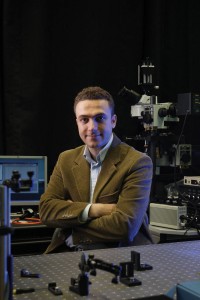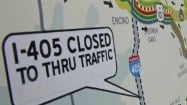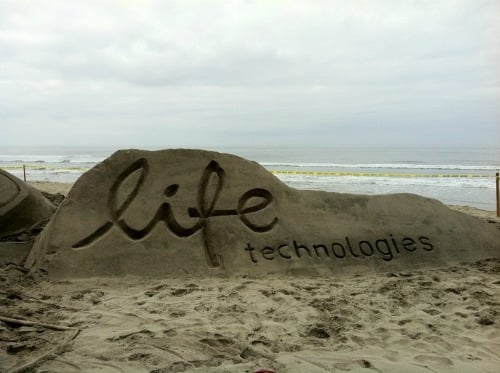Researchers at the University of California, Los Angeles, have discovered a new stem cell that assists in repairing lung airways. The discovery is significant because the airways are vital in protecting the body from airborne toxins. The airways contain glands that defend the body by producing and then removing mucus, a process which cleanses the lungs of infectious agents and environmental toxins. The study's findings have major potential for advancement in the field of lung regeneration.
Tags: Stem cell research, California, UCLA, Stem Cell, Southwest Region
UCSD Health Sciences just announced that it will partner with Pfizer to speed delivery of new treatments to market. Pfizer has been successful with its Centers for Therapeutic Innovation (CTI) program at other major research universities, in part because of a non-traditional collaborative approach that includes constant transparency, meaning that they will share resources and information at all stages of research. What each side brings to the table:
Tags: University of California San Diego, Translational Research, California, Southwest Region
Tags: genome research, Southwest, California, San Diego, Event, Laboratory Equipment Supplier, south west
 The ubiquity of cell phone technology in today's world, even in developing nations, has opened a door for biomedical researchers to invent diagnostic devices that utilize the cell phone platform to perform analyses that otherwise would require prohibitively expensive equipment. And that is just what the 32-year-old bioengineering prodigy Aydogan Ozcan is doing at UCLA's Biophotonics Lab (also known as the Ozcan Research Group Nano / Bio Photonics Lab, and contributor of the photo at right) in the Samueli School of Engineering and Applied Sciences.
The ubiquity of cell phone technology in today's world, even in developing nations, has opened a door for biomedical researchers to invent diagnostic devices that utilize the cell phone platform to perform analyses that otherwise would require prohibitively expensive equipment. And that is just what the 32-year-old bioengineering prodigy Aydogan Ozcan is doing at UCLA's Biophotonics Lab (also known as the Ozcan Research Group Nano / Bio Photonics Lab, and contributor of the photo at right) in the Samueli School of Engineering and Applied Sciences.
Tags: University of California Los Angeles, Photonics, Ozcan Nano/Bio Photonics Lab, Lab-on-a-chip Technology, flow cytometry, California, Southwest Region
For over 70 years, the Harbor-UCLA Medical Center has been home to one of the most distinguished hospitals and medical research centers in the country.
Tags: University of California Los Angeles, California, UCLA, new construction, Southwest Region
An important subfield of molecular biology has come into its own with improvements in technology and major NIH funding. The field is glycobiology, and the NHLBI's new “Program of Excellence in Glycosciences” (PEG) is providing $18M over 7 years to researchers at UCSD's Glycobiology Research and Training Center (GRTC) to advance the emerging science.
Tags: University of California San Diego, California, UCSD research, NIH, Southwest Region, Biomedical Research Funding
Five years ago the federal government decided that private biomedical research companies were not bringing enough new technology to patients in need, and that it would step up that process by having the NIH fund research at academic medical institutions to bridge the gap between basic science and practical treatment. Thus the CTSA was born: the Clinical & Translational Science Awards program, a research consortium supporting the translation of science into medicine by accelerating laboratory discoveries.
Tags: University of California Los Angeles, University of Minnesota, Translational Research, Minnesota, California, Southwest Region
The University of California, Irvine and French scientists have discovered the switch that causes healthy brain cells to become epileptic. This breakthrough may help treat and prevent the most common form of epilepsy, temporal lobe epilepsy (TLE).
Tags: University of California Irvine, cell biology, California, Research, Irvine, Southwest Region
Using computational models, UC Riverside neuroscience researchers Maxim Bazhenov and Giri Krishnan discovered precisely how neurons function during epileptic seizures. With this information, they were able to determine what chemicals could impede the neuron’s misfiring, which could lead to breakthrough discoveries in new antiepileptic drugs.
Tags: biomedical research, cell biology, California, UC Riverside
 Now, rather sooner than one might have wished, that vision of a less-car-dependent populace is being put to the test. It's being called Carmageddon, the closure of the 405 Fwy through the heart of LA for an entire weekend this July 15th (at midnight) through the 17th. What will this human science experiment in the living laboratory tell us about Angelenos' prognosis for survival in a more sustainable world?
Now, rather sooner than one might have wished, that vision of a less-car-dependent populace is being put to the test. It's being called Carmageddon, the closure of the 405 Fwy through the heart of LA for an entire weekend this July 15th (at midnight) through the 17th. What will this human science experiment in the living laboratory tell us about Angelenos' prognosis for survival in a more sustainable world?According to a UCLA Newsroom report entitled "The Day the 405 Stood Still":
 At UCLA, shutting down is not an option: With a major hospital to run, summer camps to attend and petri-dish experiments to keep alive, university officials expect 8,000 to 10,000 people on campus.
At UCLA, shutting down is not an option: With a major hospital to run, summer camps to attend and petri-dish experiments to keep alive, university officials expect 8,000 to 10,000 people on campus.UCLA Today in its "UCLA braces for Carmageddon" piece adds:
More than 1,900 hospital employees will keep UCLA’s two hospitals purring, with several hundred doctors, nurses and other staff bunking in campus residence halls in case of an emergency. Roughly 200 children will attend long-ago promised sports camps, about 200 MBA students start classes, and 150 teachers from China will arrive at LAX to begin teacher-training on campus.
UCLA Medical Center's response to the potential nightmare is to put itself on high alert, take measures to see that it continues to function normally, and make on-campus housing available for commuting staff "in case of an emergency." Presumably that emergency would be impassable roads. They don't seem to anticipate an influx of patients as a result of the freeway closure, though the way the event is being imagined in science fiction terms makes it sound like casualties are inevitable. Will road rage turn into rioting and looting? Will there be a mass psychiatric meltdown? Will people trip on the unfamiliar laces of their walking shoes? Rest assured, more police will be out (on bicycles?), according to UCLA Today's article:
The UCPD and UCLA Transportation are among the departments scheduling extra staff to make sure everything runs smoothly, and both UCPD and the LAPD are considering overnighting in UCLA dorms.
Tags: University of California Los Angeles, Southwest, California, Los Angeles, Sustainable Architecture, UCLA, Event, laboratory


